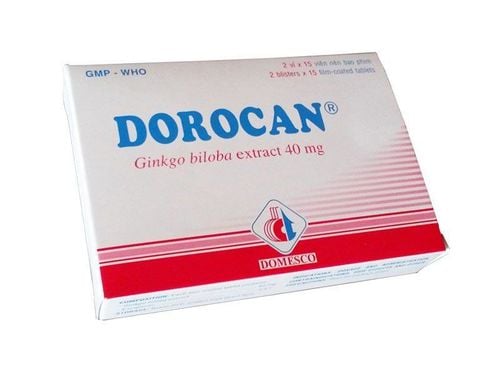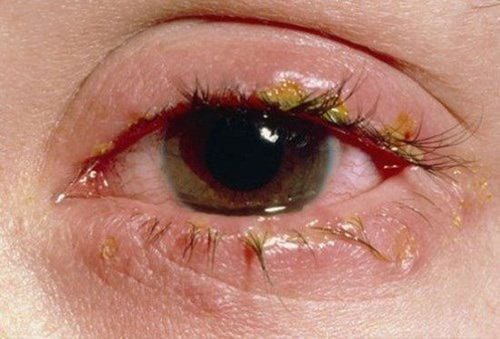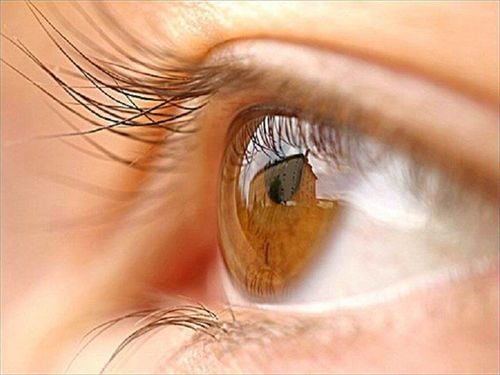This is an automatically translated article.
Colaf is a drug used in the treatment of chronic diseases in the elderly, cataract prevention, vision enhancement and antioxidant. Let's find out information about the uses, dosage and notes when using Colaf in the article below.
1. Uses of Colaf
Colaf medicine is prepared in the form of soft capsules, box of 12 blisters x 5 tablets. Each Colaf tablet contains the following main ingredients:
β-carotene suspension 30%: 50 mg; Selenium-containing dry yeast: 33.3 mg; Ascorbic Acid (Vitamin C): 500 mg; DL-α-Tocopherol (Vitamin E): 400 IU; Excipients: Soybean oil, palm oil, lecithin, white beeswax, concentrated glycerin, D-Sorbitol 70%, propylparaben, ethyl vanillin, methylparaben, red iron oxide, purified water,... Effects of ingredients present in the drug Colaf:
β-carotene:
As a precursor of vitamin A, β-carotene has an important role in the body, especially for children's development and vision. Therefore, when providing β-carotene, the body will improve vitamin A deficiency, thereby helping to improve eyesight, vision, reduce the risk of blindness and strengthen the immune system,... The body is deficient in β-carotene, directly reducing Vitamin A, will lead to the inactivation of the immune response, the body's ability to fight infections is weakened and the skin is easily damaged by sunlight. God. Selenium:
A micronutrient with antioxidant and immune-boosting effects. It helps to slow down the aging process, prevent metabolic disorders and prevent some chronic diseases in the elderly such as heart disease, cancer Vitamin C:
Helps the body produce collagen, a very important protein. Important for the development and functioning of connective tissues, muscles, bones and blood vessels. Vitamin C is added to the body to help support the treatment of fatigue, flu or recovery time after severe illness to enhance resistance and help wounds heal. Vitamin E:
Has an important effect in helping the body to prevent oxidation processes. Vitamin E is suitable for pregnant women, people with skin diseases, people with cancer, heart disease. Besides, it also helps anti-aging by preventing the attack of free radicals and has the effect of protecting vision.
2. Indications and contraindications to the drug Colaf
Colaf is indicated in the following cases:
Support treatment in elderly patients, who need vitamin and mineral supplements during the recovery period to enhance resistance. Prevention of vision disorders such as: macular inflammation, cataracts, retinal degeneration. Supportive treatment of neurological disorders such as Parkinson's, Alzheimer's, memory impairment. Prevention of oxidation. Colaf should not be used in the following cases:
The patient has a history of allergy to any of the ingredients in the drug. People with a history of or are having kidney stones, oxalate metabolism disorders, and increased oxaluria. Thalassemia . Glucose-6-phosphate dehydrogenase (G6PD) deficiency. People with an excess of Vitamin A.
3. Dosage and how to use Colaf
Usage:
Colaf drug is used orally. Patients should drink 1 tablet of Colaf with half a glass, should not chew, break, crush, because it can reduce the effectiveness of the drug. Take the drug after meals to increase the absorption of the drug Dosage:
Adults: 1 tablet/time, 1 time a day. Use the drug for 4-6 weeks for effective results. Children : Not recommended for use
4. Colaf drug side effects
When using Colaf, some patients may experience unwanted effects such as:
Nausea, vomiting, diarrhea, heartburn, abdominal cramps. Fatigue, flushing, headache, insomnia. Increased urinary oxalate. When experiencing unwanted effects during Colaf treatment, patients should stop taking the drug and notify the doctor for appropriate management instructions.
5. Notes when using Colaf
Use caution when using Colaf during treatment with other drugs. It is necessary to adhere to the prescribed method and dosage. The allowable dose of selenium for use is 75-150 mg/day for adults. Doses above 200 mg/day should not be used because of possible toxicity. Using Vitamin C for a long time and in high doses can cause a decrease in drug response, so if the dose is reduced, it can lead to Vitamin C deficiency for the body. Long-term use of high doses of vitamin C can cause an increase in urinary oxalate. Cases of using beta-carotene containing preparations alone or in combination may increase mortality. Use caution when using Colaf in pregnant and lactating women. Pregnant women taking Vitamin A more than 8000 IU/day as recommended can cause birth defects in the fetus. Do not take high doses of Vitamin C over 3g/day during pregnancy because it will lead to the risk of scurvy in the newborn. Colaf does not affect the ability to drive and use machines.
6. Treatment when forgetting or overdosing Colaf
Missed dose:
It is important that patients take Colaf exactly as prescribed by their doctor. In case the patient has just forgotten the medicine compared to the prescribed one, the patient can quickly take the supplement as soon as he remembers it. If it is time for the next dose, take the next dose as scheduled, do not take a double dose. Drug overdose:
For β-carotene: overdose is not harmful because this is essentially a reserve of vitamin A in the body and acts as an antioxidant. Possible “Carotenemia” when the skin turns yellowish and disappears when the medication is stopped is called a side effect. Excessive use of selenium can cause toxicity. Symptoms of acute poisoning are bronchial edema, hypotension, cardiac arrest, decreased reflexes and central nervous system depression. Symptoms of subacute and chronic poisoning are jaundice and rash, discolored and degraded teeth, abnormally thick nails, hair loss, dermatitis, garlic breath, fatty degeneration and gangrene liver, mood swings and fatigue. Symptoms of vitamin C overdose include: nausea, gastritis, diarrhea, kidney stones. People with kidney stones should not take high doses of Vitamin C above 1 g/day. Using Vitamin E at too high a dose above 1200 IU/day can lead to symptoms such as headache, diarrhea, fatigue. If the patient shows the above symptoms after taking an overdose of Colaf, please immediately go to the nearest medical facility for timely treatment.
7. Drug interactions
Some drug interactions may occur when Colaf is used in combination with the following drugs:
Cholestyramine, Liquid Paraffin: reduces the absorption of fat-soluble vitamins such as Vitamins A, C, E contained in Colaf drugs Oral pregnancy: Increases plasma vitamin A concentrations. Concurrent use of Aspirin and Vitamin C will decrease the excretion of Aspirin and increase the excretion of Vitamin C in the urine. Concomitant administration of fluphenazine with vitamin C may decrease fluphenazine plasma concentrations. In addition, the acidification of urine due to vitamin C administration will alter the excretion of other drugs. High doses of vitamin C when used will destroy vitamin B12. Using Vitamin C can interfere with many redox-based tests because it is a strong reducing agent. Vitamin E helps increase the absorption, use and storage of vitamin A in the body. Iron-containing drugs: reduce the effect of Vitamin E in Colaf. Above is all information on what Colaf is, its uses and precautions when using it. Patients should carefully read the instructions for use, strictly follow the indications and dosage, consult the doctor to achieve the best treatment effect.
Please dial HOTLINE for more information or register for an appointment HERE. Download MyVinmec app to make appointments faster and to manage your bookings easily.













